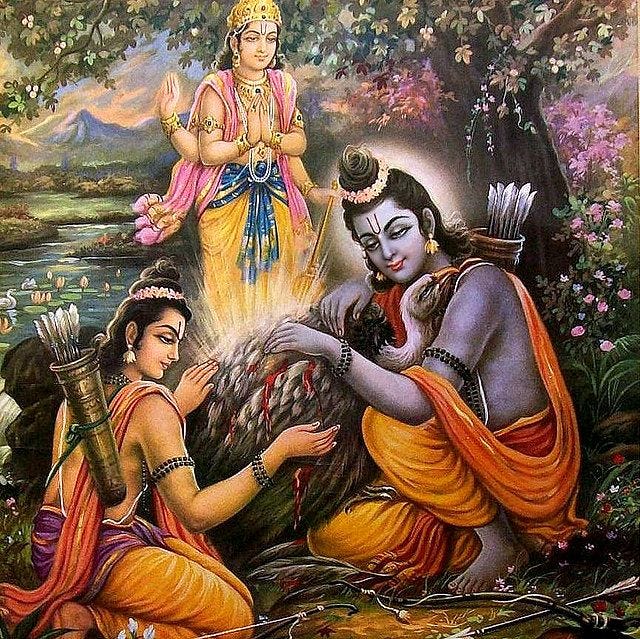Single Versed Ramayana: Ekashloki
Eastern Wisdom Weekly #4: The only verse you need to know that summarizes the whole Ramayana.
Happy Tuesday everyone 🌞
Hey, you say it’s happy but yet you share a story on Destiny and Death. Don’t worry, we will cover the series as we proceed with other editions. We will also be covering stories from different traditions, and epics and see how we can use this wisdom to enhance our lifestyle. Many of these stories will be from Ramayana and Mahabharata the two great epics of Hinduism.
These 2 epics contain not only the stories of two avatars of Lord Vishnu but also closely show the times and situations that prevailed at those times in our culture. How people felt, thought, and interacted, and how they always had a choice in each situation which made them either in favor or against the way of life. Ramayana is centered around the life of the 7th Avatar of Lord Vishnu, Shri Raam, and Mahabharata is centered around the life of the 8th Avatar of Lord Vishnu, Shri Krishna. We covered this briefly in the 2nd edition of Eastern Wisdom. We will keep covering these stories in later editions as well.
Lord Raam and Lord Krishna, the heroes of the 2 epics Ramayana and Mahabharata.
Now, Ramayana has around 24000 shlokas (verses) which cover everything, and we know that many people won’t have the time to go through the whole book. Ramayana has also been translated into many regional languages in India, it has similar renditions in subcontinents like Thailand and Bali. For this many efforts have also been made by different historians and writers to summarize this epic.
Today, we will talk about the Ekashloki Ramayana, one such attempt which translates to Ramayana in a single verse. This verse goes as follows:
Aado Raam Tapovanaadi gamanam , Hatva Mrigam Kanchanam,
Vaidehi Harnam Jatayu Marnam Sugreev Sambhashanam,
Baali Nigrahanam Samudra Tarnam Lankapuri Daahnam,
Paschaadravan Kumbhkaran Hananam Etadhi Ramayanam.
We will translate this now into phrases:
Aado Raam TapoVanaadi Gamanam: In the beginning Lord Raam went to the forest (Shri Raam, Lakshman, and Sita were forced to leave the kingdom and live in the forest, you got a glimpse of this story in Eastern Wisdom Weekly #2).
Hatva Mrigam Kanchanam: in the forest, he chased and killed a golden deer (on being prompted by Sita, but the deer was a demon planted by Ravana to lure her).
Vaidehi Haranam: Sita got kidnapped (in the process of chasing and eventually killing the golden deer, Shri Raam had to leave Sita alone and Ravana kidnapped her).
Jatayu Maranam: Jatayu the great bird was killed (after kidnapping Sita, Ravana was taking her in a flying chariot. One of the birds Jatayu saw this and tried to stop Ravana from taking her but was killed in a battle by him).
Lord Raam consoling Jatayu in his final time, who gave his life to save Sita from Ravana.
Sugreev Sambhashanam: Lord Raam approached the monkey king Sugreev (after Sita’s kidnapping, Raam went on to search for her and reached the place where the monkey king Sugreev lived).
Bali Nigrahanam: Sugreev’s brother Bali was killed by Lord Raam (to take help of Sugreev in Sita’s search, Lord Raam killed the unrighteous brother of Sugreev, who had unrightfully taken Sugreev’s kingdom and wife).
Samudra Taranam: Lord Raam and his army cross the ocean (after taking the help of Sugreev and forming an army, Lord Raam set on the search of Sita and reached a dead end when they reached the last point of the Indian subcontinent. They made a bridge to Lanka and crossed the ocean).
Lankapuri Dahanam: Burning of the golden city of Lanka (Lord Raam and his army burnt down the beautiful golden city of Lanka, which is present-day Shri Lanka).
Paschadravan Kumbhkaran Hananam: Finally Ravana and his brother Kumbhakaran were killed by Lord Raam.
Etadhi Ramayanam: This is the complete story of Ramayana.
This is a beautifully summarized retelling of Ramayana. There have been many incidents in the epic, but these incidents from the Ekashloki Ramayana, just provide a flow on why and how this epic happened. So next time, anyone asks you about Ramayana, you can confidently tell them this verse, the meaning of it or just a plain sequence of events that happened. Super short, useful and still powerful 🔥
Or you can just share or direct them to our work here 😉 Until next time, have a great week ahead.
🕉️ Dharmo Rakshati Rakshitaha ☀️
Dharma protects those who protect it.




